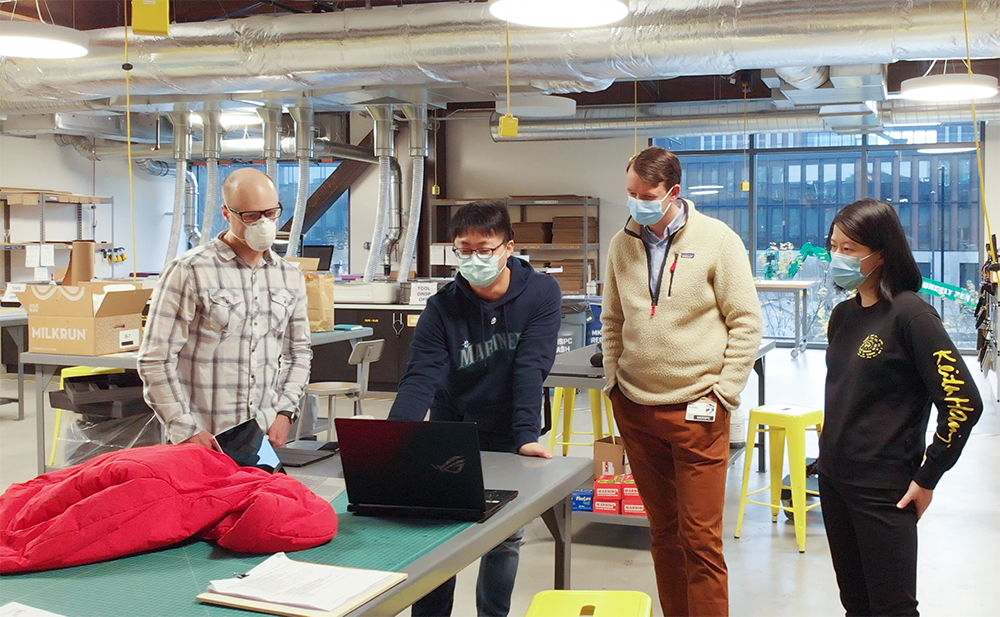The University of Washington’s MS in Technology Innovation (MSTI) program blends high-quality faculty instruction and collaborative learning experiences with mentorship from GIX Consortium companies. The Launch Project program pairs students with professionals to tackle real challenges facing their companies, the MSTI curriculum leverages industry expertise, and the GIX Prototyping Labs provide a space for professionals and students to work collaboratively and learn from one another while building a project. Further, the presence of resident startups and member companies in the Steve Ballmer Building means students will cross paths with engineers and technical leaders regularly.
Here are five of the many ways that MSTI students can work alongside industry professionals during their time at GIX, to gain relevant experience and preparation for their technology careers:
- Participating in Launch Projects: Students develop solutions to challenging design, engineering, and business problems during the six-month Launch Project experience. The capstone-like projects allow teams of 3-4 students to work with experts from GIX Consortium companies to explore specific problem spaces, scope down to the specific problem they would like to address and develop a solution in partnership with their industry mentors. The Prototyping Labs provide the necessary resources to explore building custom hardware and software devices, with students and professionals working together turning conceptual designs into tangible products for further testing and development.
- Receiving practical instruction on how to pitch new ideas and explain solutions. MSTI business and entrepreneurship courses prepare students to identify market opportunities and to plan, pitch, and market their ideas for potential funding or further development. Regular opportunities to present project concepts, prototypes, and business models throughout the program allow students to receive feedback from industry audiences, investors, and local venture capitalists.
- Joining the GIX Prototyping Labs staff: The Prototyping Labs are staffed by full-time professionals and student staff who are experts in the available tools and technologies. Students who are hired as part of the Labs “Crew” receive extensive technical training and learn how to share their knowledge with fellow MSTI students and industry professionals who work in the Labs. Crew members find this additional hands-on experience and exposure to a wide variety of design challenges incredibly useful in their future professions.
- Learning from subject matter experts and mentors: The MSTI’s design thinking approach to creating technology solutions requires students to gain an in-depth understanding of the problem space they are exploring and to gather details on the prospective users of their technologies. Project-based work informed by real-world challenges is embedded throughout the MSTI curriculum, providing students ample opportunity to practice this approach under the guidance of subject matter experts from companies, non-profits, government organizations, startups, and research groups. Students may not be knowledgeable about specific problem spaces or projects, like the symptoms of Parkinson’s disease, the experience of wildland firefighters, or how audio companies process data, but they learn how to systematically gather information and use it to inform and improve their designs. Project sponsors and course speakers from recent years have included Singapore GovTech, the Washington Department of Natural Resources, faculty from the University of Washington, and industry experts in robotics and connected devices.
- Building relationships with project sponsors: The collaborative nature of the Launch Projects gives Consortium sponsors the opportunity to work closely with prospective employees for an extended period, observing not only their technical skills, but how they work on teams, handle complex situations, and approach problems. In some notable cases, projects have continued at sponsoring companies, with T-Mobile and Microsoft directly hiring students from the program to continue the work. These professional connections and mentorship relationships have proven to be valuable for students long after graduating from the program.
Learn more about the UW MSTI.

